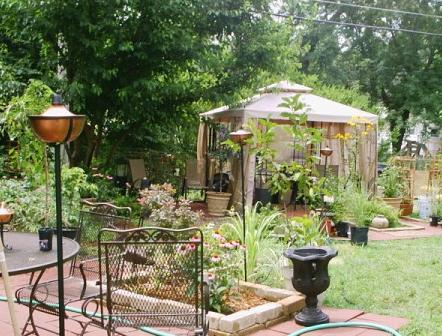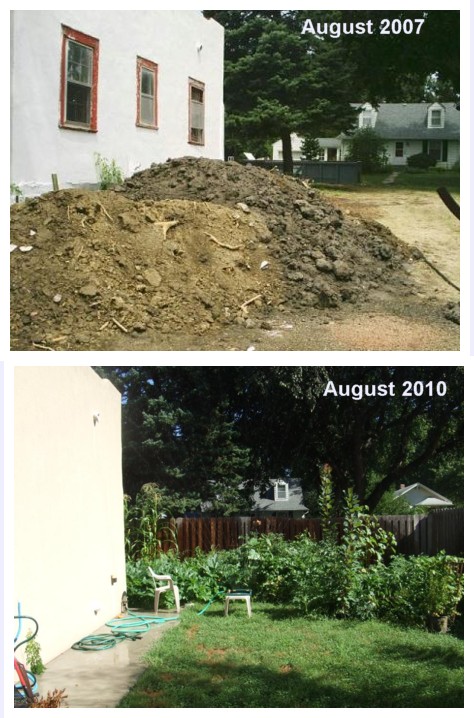The secret of life is that every soul by its nature is an Asman or Akasha, an accommodation, and has in it an appetite; and of all that it takes it creates a cover which surrounds it as a shell, and the life of that shell becomes dependent upon the same substance of which it is made.
The Hindu name for capacity is Akasha. People generally think that Akasha means the sky, but in reality it means everything. Everything in its turn is an Akasha, just as all substance is a capacity; and according to that capacity it produces what it is meant to produce. By studying anatomy one will find that the organs of the senses are all capacities according to their construction; and when that capacity is clogged, broken, or in any way troubled, then that organ of sense does not function properly.
-Hazrat Inayat Khan, a Sufi
PATIOS


- patio
- 1818, "inner court open to the sky," from Sp. patio probably from O.Prov. patu, pati "untilled land, communal pasture," from L. pactum "agreement" (see pact). Another theory traces the Sp. word to L. patere "to lie open." Meaning "paved and enclosed terrace beside a building" first recorded 1941. Patio furniture is attested from 1969.
The English term PATIO meaning 'paved and enclosed terrace beside a building' in contrast to an inner court is essentially recent having its linguistic birth in 1941 and by 1969 an industry focusing up patio furniture merchandising hits the streets as Vietnam war protesters were also hitting the streets. A story of outside furniture being replaced by patio furniture brought forth from my interest in etymology.
- furniture
- 1520s, "act of furnishing," from M.Fr. fourniture, from fournir "furnish" (see furnish). Sense of "chairs, tables, etc.; household stuff" (1570s) is unique to English; most other European languages derive their words for this from L. mobile "movable."
Hazrat had a very good teaching story involving a chair:
Another thing is that you may not be innocent as the child is innocent. The child, if it has a diamond brooch and a thief wants to take it, will give it and not know what it is giving. You should be like the king in a story which tells that a king was sitting in his room in which were carved chairs, made like tiger's heads. The eyes of the tigers were diamonds and very beautiful. The king went to sleep. When he awoke, he saw that a thief had come into the room and was stealing the eyes of the tigers. The thief said, 'Hush! Don't tell anyone I am stealing the diamonds.' The king was much amused at his boldness and confidence, saying this to the king from whom he was stealing. So, knowing that he was a thief, he let him take the diamonds.
You should not do a kindness to an undeserving person, thinking that he deserves your kindness, for the next day you will discover that he does not deserve it, and you will repent. You should do a kindness to a person knowing that he does not deserve it. Then your kindness is very great and there is no repentance.
-Hazrat Inayat Khan, a Sufi
In 2008, I mailed via the mailman the following picture I 'cut and pasted' in one of my many Newsletters to family and friends. The three dogs primary function in the Ashram is to amuse the Caretaker as perhaps the thief amused the king in the above story with the thief and his boldness and confidence. The Ashram dogs also assist me in the designing of my paths. Watching dogs expressing their own unique beingness finds similarity to my watching birds or plants express their own unique beingness.
 Humans disclose an innate instinct to mess around with Nature and dogs bear witness to this. Just as my building a pond on a backyard with a slope down to the alley. I can chuckle and say that the dogs have a linguistic connection to the Ashram pond:
Humans disclose an innate instinct to mess around with Nature and dogs bear witness to this. Just as my building a pond on a backyard with a slope down to the alley. I can chuckle and say that the dogs have a linguistic connection to the Ashram pond:- pond
- mid-13c., "artificially banked body of water," variant of pound "enclosed place" (see pound (n.2)). Jocular reference to "the Atlantic Ocean" dates from 1640s.
- pound (n.2)
- "enclosed place for animals," late O.E. pundfald "penfold, pound," related to pyndan "to dam up, enclose (water)," and thus from the same root as pond. Ultimate origin unknown; no certain cognates beyond Eng.
rahm - Arabic rahma: pity, compassion, forgiveness; sympathy, understanding; divine mercy. The root r-h-m also indicates womb; that which provides protection and nourishment, and that from which all of creation is brought into being.The English language with its NOUNS and VERBS functions well for property ownership, however, it essentially sucks rotten eggs for transmitting the finer understanding of our own beingness expressed in an earthwalk as human.
Glossary for The Spiritual Message of Hazrat Inayat Khan
http://wahiduddin.net/mv2/mv_glossary.htm
As a little girl as I used to sit on a pew with my parents in the old hometown Presbyterian church, I perceived it as interesting that adults were so focused on where they would go after they die, yet showed no interest in where they had been before they were born. I did learn that was one topic that I shouldn't bring up when I sat on my little chair in a Sunday school class. Being a 'twinkling in my parent's eyes' just didn't cut it when I was a child and it was very apparent my teacher did not plan on our discussing that particular topic and was more focused upon our coloring pictures for our parents. SCHOOL and TEACHER comes in all shapes, varieties, colors and flavors, also.
No one knows what is a person's inner religion, his inner conception. And one will find many true souls whose heart is enclosed in a kind of hard shell, and no one knows that the very essence of God is in their heart, as the outer shell is so hard that no one can understand it. That is why a Sufi from Persia said, 'I went among the pious and the godly and was so often deceived; and I went among those who were looked down upon by others and among them I found real souls.' It is easy to blame, it is easy to look down upon someone, but it is difficult really to know how deep someone's soul is.A WOMB is an ENCLOSED PLACE as is a pond or a dog pound and as is my childhood Presbyterian church building. WOMB is one of those terms that I personally classify as NOT being gifted the English language from an etymological root from the Latin language system within the ancient Roman Empire.
-Hazrat Inayat Khan, a Sufi
- womb
- O.E. wamb, womb "belly, uterus," from P.Gmc. *wambo (cf. O.N. vomb, O.Fris. wambe, M.Du. wamme, Du. wam, O.H.G. wamba, Ger. Wamme "belly, paunch," Goth. wamba "belly, womb," O.E. umbor "child"), of unknown origin.
asman - Farsi آسمان āsmān: heaven; sky, the celestial orb, the canopy of heaven. In esoteric terms, this is often used much the same as the Sanskrit akasha, to describe capacity or accommodation (see akasha)
Glossary for The Spiritual Message of Hazrat Inayat Khan
http://wahiduddin.net/mv2/mv_glossary.htm
Persian (local names: فارسی, Fārsi IPA: [fɒːɾˈsi]; or پارسی, Pārsi IPA: [pɒːɾˈsi], see Nomenclature) is an Iranian language within the Indo-Iranian branch of the Indo-European languages. It is widely spoken in Iran, Afghanistan, Tajikistan, Uzbekistan and to some extent in Armenia, Iraq, Bahrain, and Oman.
The Persian language, whose native names are فارسی Fārsi, Pārsi, Dari or Pārsi-ye-Dari (Dari Persian), can be classified linguistically as a continuation of Middle Persian, the official religious and literary language of Sassanid Persia, itself a continuation of Old Persian, the language of Persian Empire in Achaemenids era. Persian is a pluricentric language and its grammar is similar to that of many contemporary European languages. The Persian language has been a medium for literary and scientific contributions to the eastern half of the Muslim world.
Persian has had a considerable influence on neighboring languages, particularly the Turkic languages in Central Asia, Caucasus, and Anatolia, neighboring Iranian languages, as well as Armenian, Arabic and other languages. It has also exerted a strong influence on South Asian languages, especially Urdu, as well as Hindi, Punjabi, Sindhi, Saraiki, Sylheti, and Bengali.
http://en.wikipedia.org/wiki/Persian_language
..Entry not finished ... have a GMO with my 3 adult daughters (Girls Morning Out)


No comments:
Post a Comment